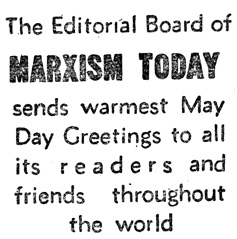
May Day in Great Britain
As May 1st is not a public holiday in Great Britain, May Day celebrations are traditionally held on the Sunday following it, unless, of course, the 1st of May falls on a Sunday. On May Sunday workers march through the streets and hold meetings to voice their own demands and the demands of other progressive forces of the country. The issues involved may include demands for higher wages and better working conditions, protests against rising unemployment, demands for a change in the Government's policy, etc.
In recent years, which have been marked by a deterioration in living standards, by the growth of unemployment and attempts to encroach upon the rights of trade unions,* workers downed tools and held demonstrations on the 1st of May as well, in addition to those held on May Sunday.
* (For example the introduction of the so-called Industrial Relations "ill, which aims at the reduction of the power of organized action by the workers.)
The material selected was taken mainly from newspapers of recent years as it was felt that this would acquaint the reader not only with the way this old militant tradition of the working class is maintained, but also introduce him to the contemporary scene of the struggle of the British workers.

May Day 1926: 100,000 workers marched in London on the eve of the General Strike* in support of locked-out miners.
* (the General Strike - the biggest strike in Britain's history (4-12 May, Г926), in support of locked-out miners; the entire economic life of the country was brought to a standstill; the treacherous leaders of the General Council of the Trade Union Congress called off the strike at its peak.)
May Day 1937: Great contingents of striking London busmen joined the march, which also expressed solidarity with Spain* and against fascism.
* (solidarity with Spain - in 1936 the Spanish fascists revolted against the Republican Government. The heroic struggle of the Spanish people was widely supported by progressive people throughout the world. The best people from the different countries of Europe, Asia and America hastened to the aid of the Spanish anti-fascists, joining the ranks of the International Brigade of.the Republican Army. Among them were a number of Englishmen. The British workers expressed their solidarity with Spain at meetings and rallies.)
May Day 1949: The Labour Government banned the march in London, but 10,000 broke through police cordons to attend a Communist Party meeting.
May Days in the '50s and '60s saw the growing movement for peace and against the Tories.
In 1961, thousands of workers struck against Tory attacks on the Health Service and the Budget concession to surtax payers.* In 1968, the May Day slogans of the Communist Party march through London were: "Unite and Act for a New Policy", "Put People Before Profit" and "Britain Needs Socialist Change". The banners demanded: "End the Wage Freeze - Stop the Closures", "Elections - Keep Out the Tories with Labour and Communist Majorities", and "National Independence for All - Outlaw Racism".
* (the Budget concession to surtax payers - on one pretext or another, British Government, both Conservative and Labour, aim in their price and tax policy at shifting the heavy burden of high prices and taxes on to the workers.)
|
ПОИСК:
|
© GENLING.RU, 2001-2021
При использовании материалов сайта активная ссылка обязательна:
http://genling.ru/ 'Общее языкознание'
При использовании материалов сайта активная ссылка обязательна:
http://genling.ru/ 'Общее языкознание'